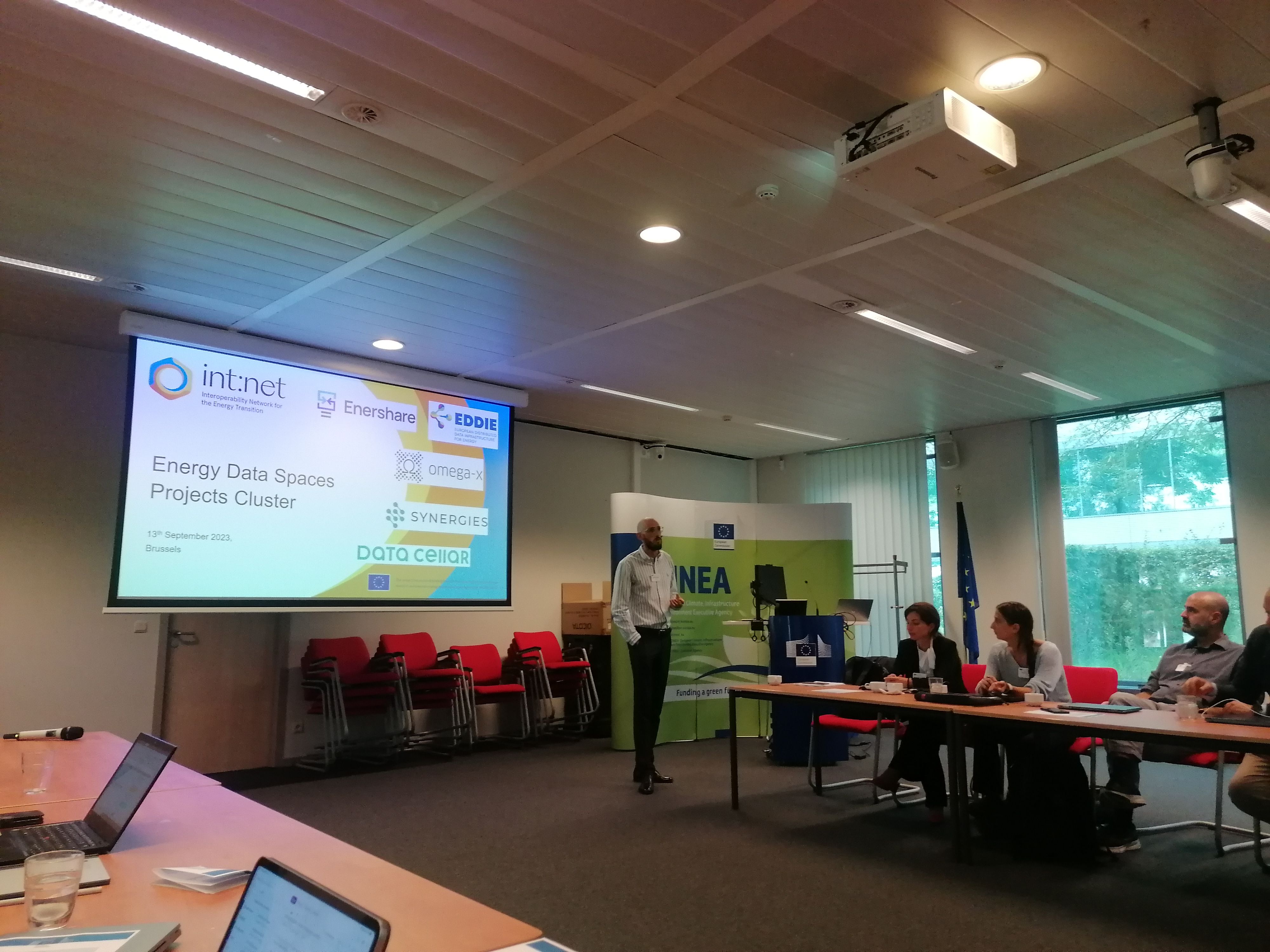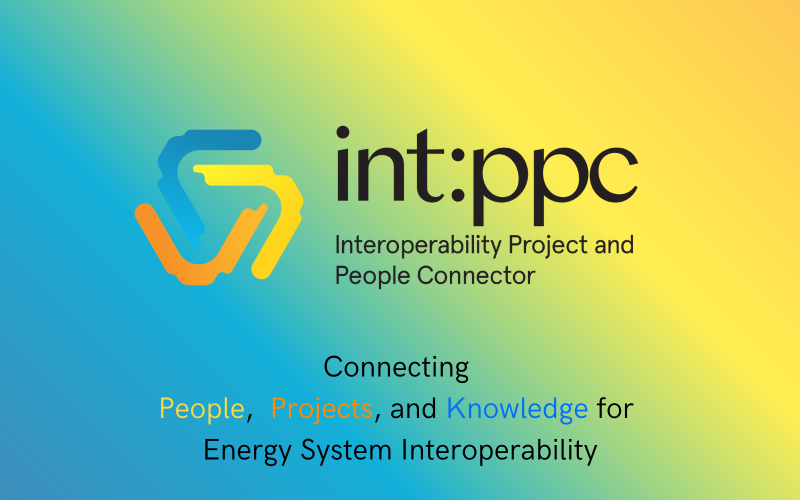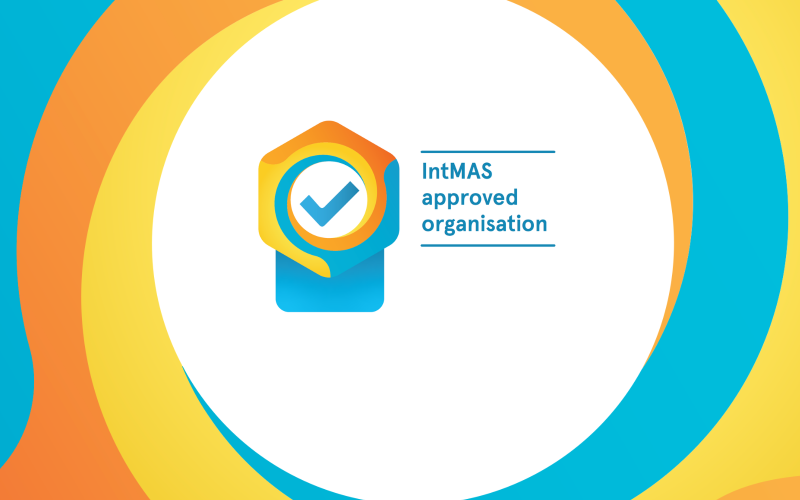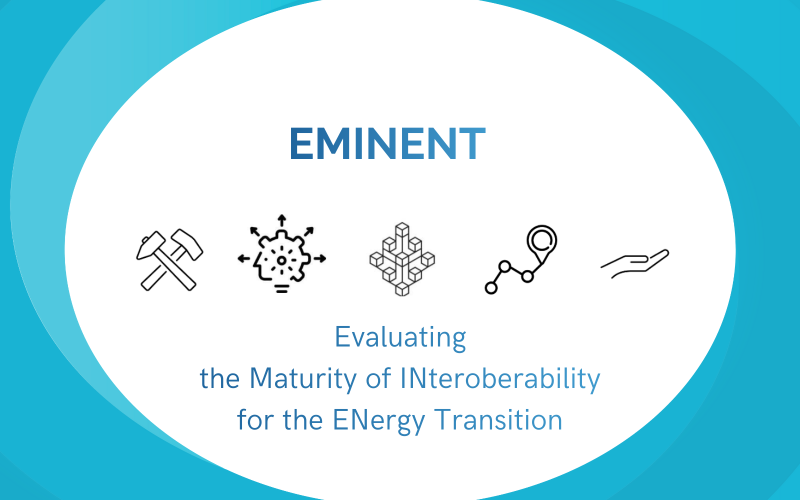Energy Data Space Cluster Workshop
The workshop explored the current initiatives that target to establish a data strategy in the energy sector, associated with the creation of reliable and secure common energy data space in Europe; it has been composed by several sessions, involving different categories of system actors. The energy sector undergoes a dynamic policy evolution to respond to the priorities of the EU Green Deal, the REPowerEU targets and the energy crisis: implementation acts, building renovation, network code, also the DATA Act have been mentioned: Issues on Governance are not in the focus of the event but being addressed by the proposed Data4Energy sub-group of the upcoming Smart Energy expert group (SEEG), which should have a first meeting in Q4/2024
The EU has set very ambitious goals (e.g. 42.5% renewable energy in the total EU energy mix) in the Green Deal, has reinforced them through the REPowerEU plan, and established legal instruments for reaching them in the `Fit for 55’ package. These targets cannot be achieved without digitalisation. The Commission is supporting the energy system digitalisation through many R&I projects including the ones present at the workshop such as the Horizon Europe preparatory actions, which together with other initiatives, such as this workshop, are providing the needed input for the common energy data space. This input will be taken up by the upcoming DEP action for initial deployment. Data 4 Energy (D4E) working group is expected to support this deployment and future developments of this data space, which is expected to ensure consistency and certainty across the EU. It will allow to develop innovative energy services focusing on three priorites (‘high-leve use cases’) in its initial deployment. The energy data space, although based on the same foundations as the other sectorial data spaces, has its own specificities, which should be taken into account. The Commission counts on the stakeholders to develop the technical solutions needed for its deployment.
Data sharing as an imperative for Flexibility Management
In the beginning, the European Commission’s goals towards a “single market for data” have been presented, as well as the EU action plan “Digitalising the energy system”. Building on the experience of energy data hubs (data hubs have been implemented in several national initiatives, as repositories for TSO-DSO data for monitoring with dashboards), the data space is envisioned as a common reference framework which could be considered the operational conjunction among data acquisition, data analysis and sharing (enabling flexibility services), and actuation services. As one key action line of the Digitalisation of Energy Action Plan, it is an imperative to share data to facilitate demand side flexibility, smart charging and building renovations. At this scope, dedicated strategies at European level and strategic investments (e.g. via the Digital Europe programme) are planned to harmonize the numerous existing APIs and leverage existing most mature key building blocks identified as MIMs (Minimum Interoperability Mechanisms), or MVP (Minimum Viable Product) for data spaces. Moreover, particular attention is devoted to the data model architecture: mixed central, federated, or decentralized.
The following session analysed the ongoing deployments of national initiatives. The Belgian TSO Elia has established a data access platform, which also aims at integrating behind-the-meter data, in order to “adjust the demand according to the generation”. The proposed modular open platform is based on the Elia data hub, an open API framework (based on re.alto subsidiary), the marketplace “TraXes”, and the service “EPIC” (Elia Portal Interface for Customers). Envisioned next steps will address further population of the platform, e.g. by inclusion of additional services and data sources (from DSOs and commercial data) in the platform.
The Danish TSO Energinet presented a dedicated deployment strategy for its data hub, including a roadmap towards the open source DataHub 3.0 / Green Energy Hub, which enables the data sharing across TSO, distributed generators, and the consumers via DSOs and suppliers. Key contributions are: (i) data access of third parties as data service providers to empower the consumers and (ii) the use of CIM (Common Information Model) as data model for TSO-DSO system integration, improving the data granularity. The flexible tariffs are compelling Incentives for users to participate (leading to 12.94% drop in peak hour usage between 2021 and 2022)
The French TSO RTE presented its data portal strategy with a strong focus on consumer engagement towards voluntary reduction in an alert case as well as towards reducing the carbon footprint of its consumption. The EcoWatt app, which became extremely popular in France, allows the final consumer to monitor the congestion level of their electricity system and promote specific emergency actions; it is directly connected to the product “Eco2Mix”, which provides information in real-time and on past time periods about power production, exchanges and consumption. The open API, for app development, would constitute a valuable starting point for further expansions from congestion management to reducing CO2 emissions and other Third Party services.
The approach of the Austrian DSO Österreichs Energie focuses on decentralised data exchange, based on agreements between local market actors. Key elements are based on a complementary standardisation of (i) communication protocols, (ii) data formats, and (iii) business processes; these baselines lead to a full interoperable system, without a central hub and enabling peer-to-peer exchanges based on eIDAS and open standards for authentication and authorization.
The Estonian TSO Elering has presented the ongoing work on the Estfeed Datahub, as central solution that manages the data sharing, initially for the electricity grid and later on for gas as well, among prosumers, network operators, aggregators, energy service providers and balance responsible party. Its customer portal allows the management of permissions and metering points, as well as information on production and consumption. The interest is demonstrated via the high percentage, 40%, of contracts based on spot price. In the future much more real time metering data will be available with a resolution of 15 minutes.
Under a recently-started Germany study, the Future Energy Lab project “CvsE - Cloud Computing vs. Edge Computing“ is studying the applicability and challenges of local edge computing technologies for the power systems applications.
Data - a rich source but not business as usual for system operators
Panellists brought to the table their experience from national initiatives, they expressed their wish towards common rules, decentralised model, generalised framework to understand the global picture and clear governance framework. The evolving number of data sources have the potential to generate transformational change, and system operators would benefit from tackling the complexity of digital solutions not in isolation. A harmonized data management framework is deemed necessary for TSOs and DSOs and also for integrating flexible services for ’behind the meter’ and it would create synergies in digital Infrastructure investments across countries and beyond the energy sector. As such national initiatives agreed on the necessity of a common European vision, resulting in a reference architecture model and promoting key elements as open source. Moreover, standardized data models are fundamental for TSO-DSO cooperation (e.g., CIM and GOPACS), in addition to common solutions across different governance models (e.g. central, federated or decentralized).
Successively, the session on commercial data highlighted the necessity to align and make interoperable the systems and apps of the various energy assets behind the meter. The energy sector experiences an increasing fragmentation of the industry itself, with the arrival of electric vehicles, solar panels, heat pumps and batteries. From the manufacturer’s point of view, it requires standardized procedures to be applied by every manufacturer, commonly agreed asset attributes and flexibility profiles in order to simplify registrations of assets (e.g. with a central flexibility registry). Flexiblepower Alliance Network promotes the use of open standards to address energy flexibility (e.g. with Open Flex Alliance as standardized API for heat pump); particularly, the S2 component (modelled with SAREF) interconnects the central energy manager with the resource manager of the various home devices (e.g., EV, battery, smart devices).
DCBEL, French-Canadian SME, pursues the integration of wholesale and retail market as well as the automation of flexible residential DER implicit participation. Agreements on interoperable communication protocols and real-time data flows were declared necessary to mitigate imbalances in electricity networks. Extreme decentralisation and extreme localisation of planning and generation won’t be controllable without paving the way for an active customer journey; as key principle, the choice (and change) of supplier and Flexibility Service Provider (FSP) per each DER shall remain free and simple. The final consumer must achieve clear benefits in managing their device data while reliable grid operations requires real time data streaming and system control : to engage the end users, concrete comparisons with respect to the “no action” conditions shall be deployed, in addition to new rewards mechanisms different from the dynamic prices (uniquely associated to the €/kWh value).
From the EU DSO Entity perspective, the main driver for the customers is the access to more service providers. In addition, the trust among the involved parties (achieved via clear governance rules) is essential. Governance also requires a clear strategy on data management, which remains a responsibility for member states despite needed international cooperation, involving TSO, DSO, energy communities, aggregators and EV charging operators. E.DSO highlighted DSO’s roles in enhancing the cooperation among grid-connected customers and producers (ensuring the deployment and respect of governance rules); specifically, the opportunities for efficient demand-side response programs require accurate, interoperable and standardized data formats, while ensuring the protection of sensitive customer data. EU DSO sees the data space not as a big centralised database, but rather like distributed data sources accessible through a portal and APIs, linking and leveraging existing data repositories. They promote the use of generic building blocks, standards and open-source software.
The E.DSO regards the data space as a trusted framework and a set of rules for data sharing and interoperability. With it the DSOs can harness data to implement demand-side response programs more efficiently, reducing peak loads and enhancing overall grid stability. Customer engagement should/will be promoted by offering them insights into their energy usage and possibility to participate in the energy market. It was stressed that the DSOs could play a crucial role of the governance of the data space. The existence of a number of obstacles towards a fully functional data space, was acknowledged.
DSSC to develop a Blueprint for Data Spaces as its central task
The cluster of Horizon Europe projects on energy data spaces have contributed with a dedicated workshop session. The cluster activities are coordinated by the CSA int:net, keeping a constant and direct collaboration with the project Data Spaces Support Centre (DSSC) on cross-sectorial building blocks; the cluster has also contributed to the upcoming ETIP SNET policy paper, highlighting the key challenges and recommendations. OMEGA-X has highlighted the importance of connecting the energy deployments with the various European initiatives on the topic (e.g., IDSA, GAIA-X, BDVA, FIWARE) and considers, as baseline, the conjunction of open interoperable APIs, semantic data interoperability, cybersecurity, and open-source components. ENERSHARE is focusing on the development of a semantic model, to be integrated in the available vocabulary hub, as well as the MVP of energy data space. DATA CELLAR proposes the achievement of interoperability via key steps: definition of use case and system architecture, data model, semantic interoperability requirements, implementation, and data sharing during demonstration activities). EDDIE project focuses on the use of AIIDA (Administrative Interface for In-house Data Access) to interconnect edge devices and a Paas (Platform-as-a-Service) to uptake the service providers. The approach for the federation of different data spaces is a key element of SYNERGIES project: multiple data spaces instances (which belong to a private cloud, a centralized cloud or private infrastructures) are interconnected, linked on the common framework for data spaces integration, orchestration and management. The projects cluster is commonly cooperating on the definition of reference use-cases for the Common European Energy Data Space (CEEDS); as next step, foremost importance is assigned to the key building blocks for the deployment of the priority use-cases, cooperating with Gaia-X and DSSC.
GAIA-X stresses the need of Compliance and Certification
The last session of the workshop concerned the data spaces connectors. Gaia-X proposes an ecosystem for the development of use-cases at European level and offers the “Gaia -X compliance”, which involve the labelling process and include the actuation of governance aspects (leading to specific attributes and criteria) in the specific industry ecosystem.
The approach of Gaia-X Austria defines a structured framework, without restricting to a specific software (instead, promoting the compliance of a software with the framework) and avoiding a single best solution. The highlighted open source stacks are, among other existing ones, Eclipse Dataspace Components (EDC), Gaia-X Federation Services (GXFS), and Pontus-X.
Another connector for data sharing is offered by the project OneNet; it is the key component that interconnects each ecosystem platform to the OneNet framework (composed by the decentralized middleware, the orchestration workbench, and the monitoring and analytics dashboard). Moreover, the OneNet connector, following IDS specifications, is based on FIWARE Orion Context Broker and NGSI API.
Guidance on the development of energy data spaces comes from DSSC; this project is finalizing the overall “data spaces blueprint”, which includes the glossary, the conceptual model, the overall integration document and the data spaces building blocks. Additionally, the expert and thematic groups address selected topics (e.g., technology, business, and governance) from the domain-agnostic perspective. In relation to DSSC, the projects of the energy data spaces cluster are collaborating in the energy interoperability task force and plans to publish a position paper “Energy Interoperability Framework”, which has a specific focus on technical and semantic interoperability. In general, session contributors have agreed on focusing on identity management and authorization & authentication as well as consumer consent management as key elements for regulated and commercial data spaces, but also GOPACS and CIM ontology as key building blocks for the TSO-DSO domain.
Wrap-up
Overall, the workshop highlighted the necessity to group a large variety of stakeholders groups (DSOs, TSOs, manufacturers, regulators, aggregators, policymakers, researchers) to systematically collaborate with precise strategies. Although some national initiatives have demonstrated an advanced implementation of data infrastructures, investment in data infrastructures across all member states would largely benefit from cross-fertilization of individual effort. It has been stressed that a common European Data Space is NOT to build a central data repository or central registry at European level for energy data but to focus on Single Market aspects for operators and solution providers. The national initiatives would flourish through common rules in a Digital Single Market and joining efforts on building blocks as well as open source projects, , whereas asset manufacturers shall enable the interoperable data sharing of appliances with open source APIs and standardised data models. As an upcoming step, starting from the identified reference use cases, the design of architecture models and necessary building blocks have the highest priorities for the cluster projects, funded under Horizon Europe [1].Building on the momentum of national lighthouse projects, the idea of an online repository would increase awareness and exchange of good practice.
[1] Establish the grounds for a common European energy data space - HORIZON-CL5-2021-D3-01-01 https://ec.europa.eu/info/funding-tenders/opportunities/portal/screen/opportunities/topic-details/horizon-cl5-2021-d3-01-01
More information:
→ Energy Data Spaces Workshop - Slides part 1
→ Energy Data Spaces Workshop - Slides part 2
→ European Commission Website





